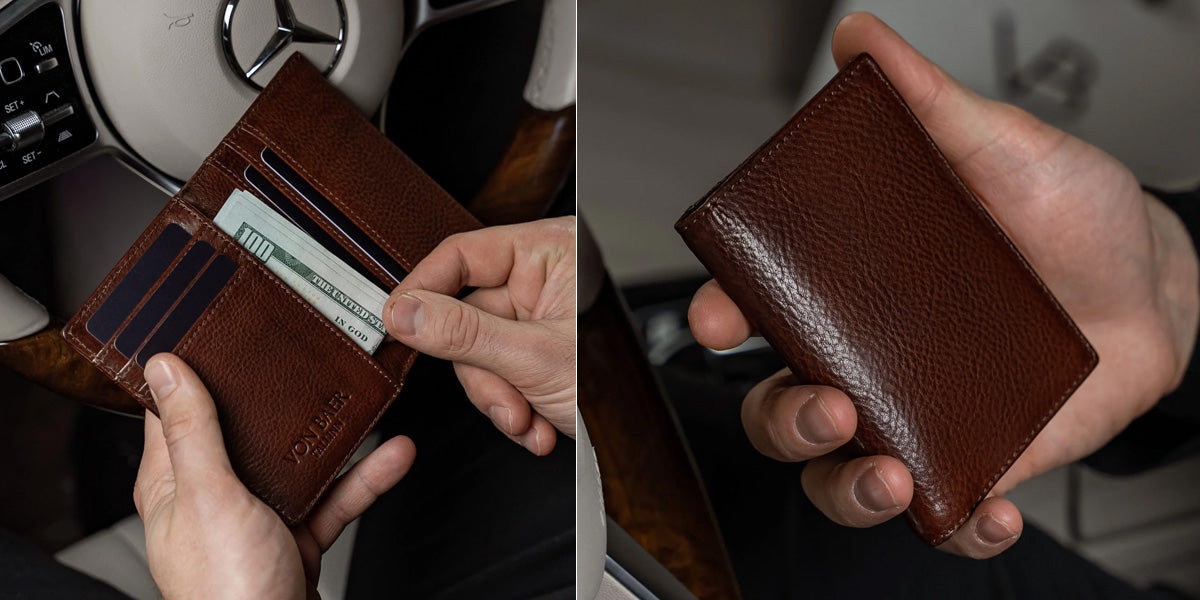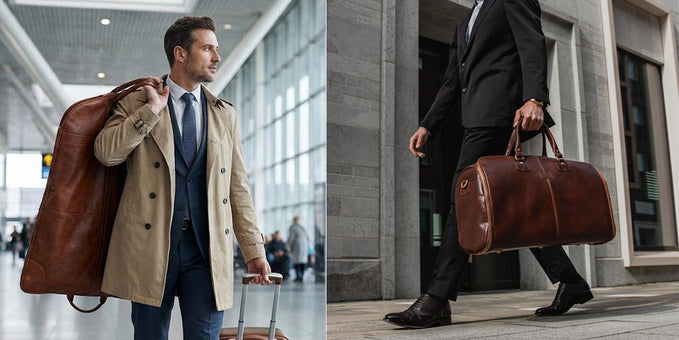Are Wallets Obsolete in 2026?

As mobile payments, digital IDs, and cashless conveniences become the norm, you may find yourself wondering:
Is there any real need to carry a leather wallet in 2026?
Here at Von Baer, we still recommend a wallet (although you could say we're biased).
In this post, we'll compare the pros and cons of going "wallet-less", and make the case why the traditional leather wallet should still be a staple in your everyday routine.
Can You Solely Rely on Mobile Payments?

Mobile payments are wonderfully convenient—until they aren’t.
Apple Pay and Google Wallet are two examples of digital wallet solutions that have become major parts of our lives.
Downloaded straight onto our smartphones, they have streamlined everyday transactions.
BUT: When your phone dies, Wi-Fi or cellular service is down, or you encounter a retailer that doesn’t accept digital payments, your wallet provides a dependable fallback.
Having access to cash and physical cards ensures you have a payment option that doesn’t rely on technology.
Expert Tip: Think of your wallet as an “emergency kit” for payments. To make it effective:
- Include a spare credit card, a small amount of cash, and a copy of important ID cards, so you’re covered even if your digital tools fail.
- Consider situations like a power outage, emergency scenario, or a trip to an unfamiliar place where having essentials on hand proves beneficial.
Using a wallet doesn’t mean overloading yourself; a slim cardholder can carry a few essentials without adding bulk, making it easy to keep in your pocket or bag, like the Minimalist shown below:
Security features such as biometric authentication (including facial recognition and fingerprint recognition) can boost protection.
However, many people are concerned about privacy. Not everybody trusts big tech companies with their sensitive data.
Digital wallets rely on technology and require you to put your trust in external entities.
Cash: Still Essential for Certain Situations

While cash use is declining, it remains crucial in various everyday and travel scenarios.
Some smaller businesses, rural areas, and specific service providers still prefer or even require cash
Cash transactions can also simplify tips or spontaneous purchases, such as a coffee or newspaper, without needing to scan or sign - for a modern day cash focused wallet, try this money clip wallet.
For frequent travelers, a wallet keeps different currencies organized and accessible without depending on sporadic ATM or card availability in some countries (and avoiding transaction fees in other currencies).
Having cash ready for unforeseen expenses, like an impromptu taxi ride, is particularly useful if your phone runs out of battery or data.
Expert Tip: Travel with a wallet that has a dedicated cash compartment or money clip to keep bills organized by currency or purpose. This travel wallet has multiple compartments for when you're traveling:
Carrying small cash amounts in different denominations keeps you prepared without fumbling for change.
Takeaway: Cash remains a flexible option in a wallet, especially when you’re on the move or in cash-preferred places.
Physical ID for Convenience and Peace of Mind
Digital IDs are gaining ground, but their adoption isn’t universal.
Many official services, institutions, and even certain businesses still require physical forms of identification.
Driver’s licenses, passports, and health insurance cards remain essential items for identity verification in a range of scenarios.
Relying solely on digital IDs can cause problems if your phone malfunctions, is lost, or is stolen. Retrieving digital ID copies often requires internet access, which may not be available when you need it most.
Expert Tip: Keep the physical ID cards you’re most likely to need daily or during emergencies in your wallet, while limiting duplicates and unnecessary items. For example, carrying a single government-issued photo ID and one insurance card simplifies access if you need quick verification.
Don't think you have room? Consider the Grant leather card case, which is a sleek wallet that can handle more cards than average:
Takeaway: A wallet keeps critical ID documents secure and easily accessible, covering you in various situations.
Privacy and Data Security Concerns in Mobile Payments

Mobile payments come with built-in convenience, but every transaction leaves a digital trail.
This data is often accessible to third-party intermediaries, exposing your spending habits, location, and personal information to data mining or, in some cases, hacking.
For those concerned with privacy, physical transactions offer an offline option that helps keep some details private.
For instance, cash transactions don’t leave a digital footprint, allowing you to choose when to keep purchases private without relying on complex app permissions.
Expert Tip: Establish a method for managing your payment options by reserving certain purchases—like local, low-cost, or personal items—for cash transactions.
Paying in cash for recurring expenses, like a weekly market visit, limits your digital footprint, helping reduce data tracking.
Protection Against Digital Fraud and Cybersecurity Risks

Although mobile payments include security features, they are not immune to cybersecurity threats.
As methods like phishing, hacking, or device cloning evolve, these risks can jeopardize your financial information.
For example, if a scammer accesses your mobile payment credentials, your entire financial profile may be compromised.
Physical credit cards, however, aren’t as vulnerable to digital security risks and can be safely stored in a wallet as a “firewall” in case of a digital breach.
What about card skimming?
You may argue that card skimming is more of a problem than data tracking, and that's a fair point. One way you can mitigate this is by using a wallet protected by RFID-blocking technology, which at least means your card is safe when it's in your wallet - all Von Baer wallets have this built in (see them here).
Learn more about RFID wallets here.
The solution? Do both, spread the risk
Spreading multiple forms of payment across both digital and physical means helps add protection.
Keeping a couple of cards for emergencies in your wallet ensures you’re covered if your mobile payment method is ever compromised or temporarily inaccessible.
And not linking all of your accounts to one device ensures you have an offline backup in a worst case scenario.
Professionalism in Networking and Everyday Interactions

When networking, a wallet can be a tool for professionalism.
Reaching into a sleek leather wallet to hand over a polished business card during a meeting shows a level of care and attention that a quick digital contact exchange can miss.
A physical business card also creates a lasting impression, giving the recipient something tangible to remember you by.
Carrying a wallet or compact cardholder means you’re prepared without fumbling with apps or searching for digital files - this is particularly true if you're networking with older businessmen, who may look negatively upon your over-reliance on devices.
Essential items—like business cards, access passes, or even a spare key—are organized and ready, making interactions smoother.
Expert Tip: Organize a few high-quality business cards and, if relevant, a membership or access card in your wallet. Keeping essentials separate from personal items makes professional interactions more streamlined.
Takeaway: A wallet demonstrates professionalism in networking, helping you appear organized and prepared.
Personal Style and Legacy: A Wallet Reflects Individuality
A phone serves its function, but a wallet can reflect a bit of your personality.
A well-made leather wallet offers a tactile experience and matures over time, evolving into a unique piece of personal history. The natural wear in the leather (if it's authentic, full-grain vegetable-tanned leather), the subtle patina, and each small mark contribute to its character—creating a personal keepsake no digital wallet can replicate.
A quality wallet embodies heritage and craftsmanship, representing values of durability and taste. With styles available from modern to vintage, you can find a wallet that aligns with both your image and aesthetic preferences.
Expert Tip: Invest in a wallet that resonates with your personality and practical needs. Frequent travelers or minimalists might prefer a streamlined cardholder, while those who appreciate classic style may find a full-sized leather wallet with compartments offers both elegance and functionality.
Learn more about wallet style here.
Takeaway: A wallet serves as a personal expression, reflecting your style and individuality.
Rethinking the Value of a Wallet in Today’s Digital Age
While mobile payments offer convenience, a traditional wallet provides reliability, security, and style that digital tools alone can’t match.
The choice isn’t between one or the other; it’s about combining both to maximize preparedness and personal expression. In 2026, carrying a wallet isn’t just practical—it’s a conscious choice that empowers you in any scenario.

Author: Igor Monte
Igor Monte is the co-founder of Von Baer. He's an expert in all things premium leather, from being an end-user right up to the design and manufacturing process. His inside knowledge will help you choose the best leather product for you.
We strive for the highest editorial standards, and to only publish accurate information on our website.
Leave a Comment
Your email address will not be published.









